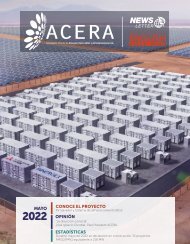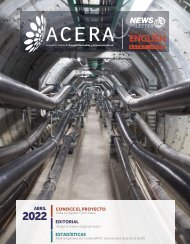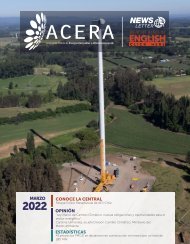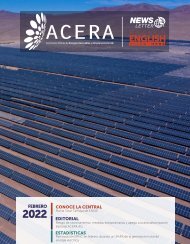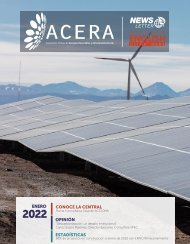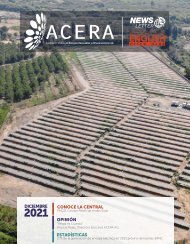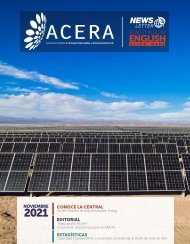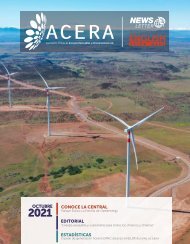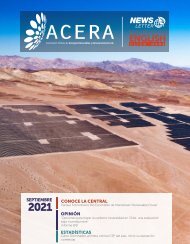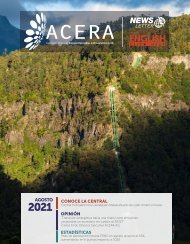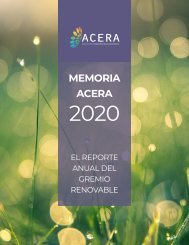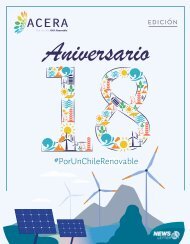Newsletter ACERA - Marzo 2021
You also want an ePaper? Increase the reach of your titles
YUMPU automatically turns print PDFs into web optimized ePapers that Google loves.
04.<br />
<strong>ACERA</strong>'S MOST IMPORTANT STUDY, AN<br />
ANALYSIS FOR THE ENERGY TRANSITION<br />
At the end of 2019, leading climate scientists made an urgent call through the IPCC (Intergovernmental<br />
Panel on Climate Change) to limit temperature rise to no more than 1.5°C above<br />
pre-industrial levels.<br />
Nearly a year and a half later, the overall results are dismayingly unsatisfactory. Between October<br />
1, 2019 and March 26, <strong>2021</strong>, the concentration of CO2 in the atmosphere has risen from 408.60<br />
ppm to 416.16 ppm, or nearly 2%, and the goal of achieving net-zero global emissions by 2050 is<br />
moving ever further away.<br />
O<br />
PI<br />
NION<br />
Carlos<br />
Finat<br />
Executive Director<br />
<strong>ACERA</strong> AG.<br />
But Chile is working on it. Throughout the last governments, the country has shown that the fight<br />
against climate change deserves to be seen as a State policy, promoting actions that make it stand<br />
out in several aspects at regional and global level.<br />
One of these actions has been the regulatory opening so that the use of Non-Conventional<br />
Renewable Energies (NCRE) as a source of electricity generation can be developed as broadly as<br />
the market allows. Thus, in 2020 we reached and surpassed, five years ahead of schedule, Law<br />
20/25, which aimed for NCRE to represent 20% of the total electricity generated in the country.<br />
By December 2020, they had reached 22%.<br />
However, reaching the goal has confirmed that "success is not the end".<br />
The high hourly shares of variable NCRE also impose a great challenge to the national electricity<br />
system so that it can operate in a technically safe and economically optimal manner. In response<br />
to this, there is talk of providing the electricity system with the flexibility to adapt to the generation<br />
conditions of the different generation sources available.<br />
Looking at the experience of other countries with this positive reality, we see that it is not only the<br />
so-called "flexibility" that is required. It is increasingly evident that the insertion of NCRE in high<br />
volumes is an opportunity to rethink the structure and roles of the different technologies in terms<br />
of meeting the requirements of security, sufficiency and quality of electricity supply.<br />
The challenge for Chile at this point is to recognize that the necessary knowledge has not been<br />
resolved and that in order to be successful in the transition from the current electrical system to<br />
the Grid of the future we will have to take advantage of the solid competencies of national<br />
engineering and, at the same time, be connected to the technological developments and<br />
advances present in some of the main electrical systems of the world.<br />
<strong>ACERA</strong> has taken up this challenge and has recently awarded a study that will provide solid<br />
technical, economic and environmental background to face one of the most important changes<br />
to be made in the national electricity system. We are referring to the closure of coal-fired<br />
thermoelectric power plants, whose withdrawal date cannot be defined by voluntarist decisions<br />
that do not take into account the technical and economic rationality of such an important<br />
decision. Through this study -undoubtedly the most important one carried out by the associationwe<br />
seek to determine the earliest route in which coal-fired plants could be taken out of service,<br />
without jeopardizing the safety of the system and without causing avoidable price increases that<br />
could affect consumers.<br />
Chile can do much more to reduce emissions from electricity generation. So much so that it<br />
would even compensate for the difficulties that other sectors may face in meeting their share of<br />
our country's NDC. To this end, collaboration between the public sector, academia and private<br />
enterprise is essential. <strong>ACERA</strong> endorses the objective of a sustainable energy transition as fast as<br />
possible, based on technical analysis that will allow Chile to continue advancing on the path of<br />
sustainable development.




